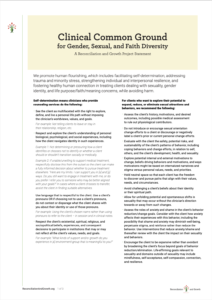Clinical Common Ground for Gender, Sexual, and Religious Diversity
Why is this document important?
Banning approaches does not stop abuse in therapy. Detailing specific harmful and ethical practices can.
Over the past years, in an attempt to prevent therapeutic harm, some U.S. jurisdictions have banned sexual orientation and gender identity change efforts, sometimes labeled as “conversion therapy,” for minors. Lawmakers in other states have initiated similar efforts for both minors and adults. However, the concept of conversion therapy, as well as similar terms, has not been clearly defined. Without a precise understanding of what these laws are attempting to ban, endeavors to enforce such laws may be applied inconsistently and in a manner that may not be in clients’ best interests. Efforts to ban gender-affirmative approaches similarly have been undertaken, and such approaches have been mischaracterized and weaponized. Clients who feel they benefited from change efforts or affirmative approaches may feel dismissed, left out, and misunderstood.
As a group of mental health professionals and academics across the sociopolitical spectrum, we believe that a shared understanding of specific ethical and potentially harmful therapeutic practices is crucial. Efforts to clarify and understand these specific practices, we believe, will more effectively honor clients’ right to self-determination and promote their well-being than bans on loosely defined approaches.
In addition, many clinicians find that when they work with clients with different political and religious values, there is an impasse, and clients withdraw from treatment. Clients across the political spectrum are sometimes harmed in treatment when there is a discrepancy between their values and needs and the clinician’s approach. We hope our document of principles and practices highlight how to respect clients’ experiences of sexuality, gender, and religion and engage clients in exploring the complexities related to these issues.
Our document highlights a nuanced clinical approach focused on self-determination, individual and interpersonal resilience, and healthy relationships. We challenge clinicians to center client needs while promoting integrity and connection as an alternative to reinforcing polarized views. We believe our document will help clinicians connect with clients when there is a disconnect between what the clinician wants to offer and what the client and family members are prepared to receive.


